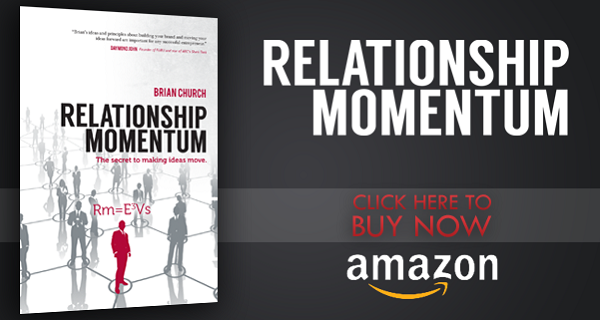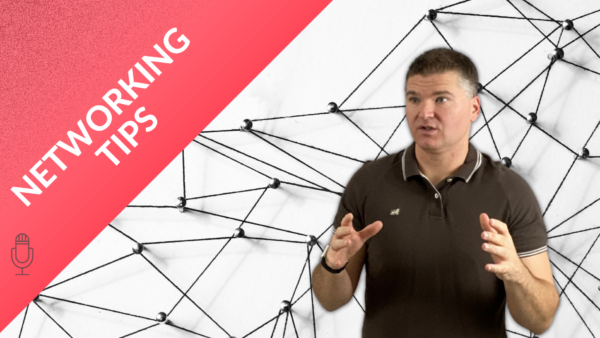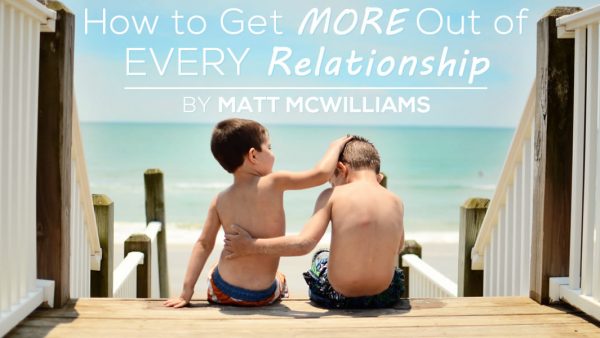When you network, are you building an army of loyal supporters or just collecting cards? That is the central question that Brian Church asks in his book, Relationship Momentum.

I had the opportunity to talk at length with Brian recently about his book and about how to network better. Brian Church is the founder and Chief Executive Officer of the consulting firm Ambassadors International. Brian’s book, Relationship Momentum is about the secret to making ideas and initiatives move. As I told Brian, his book is more in-depth and scientific than most I read (translation: he uses a lot of big words). He agreed. But, I feel like it’s a book that must be read to shift your view of what networking is and isn’t. Stay tuned tomorrow for an interview with Brian that I know you will enjoy and learn from. Subscribe to my RSS feed or get posts via email (and get my free book as a bonus) so you don’t miss it.
Today, I’ve asked Brian to share his secret for creating relational movement with you. Take it away Brian…
The United States Foreign Commercial Service (USCS) is the trade promotion arm of the U.S. Department of Commerce’s International Trade Administration. The stated purpose of these centers is to support American commercial trade through trade counseling, market intelligence, business matchmaking, advocacy, commercial diplomacy, and trade promotion programs. The USCS helped 18,500 companies facilitate 14,600 export successes worth more than $54 billion in fiscal year 2012 alone.
This is the same idea behind the local Chambers of Commerce, and, to some extent, they do the same thing. However, the existence of the USCS demonstrates that there are many more opportunities and commerce connections beyond the effective reach of local Chambers.
Imagine for a moment that your objective was to become an ambassador presiding over a private version of such an embassy. You would first need to construct a grand facility to house a similar commerce service. This embassy of commerce would make key introductions, provide shortcuts to long-term economic relationships, and grant access to all kinds of business intelligence. Imagine CEO’s, sales professionals, technical experts, and visionaries being continually drawn to your embassy because of the mutual benefits they receive.
That vision is not as difficult to obtain as you might think.
Your first thought might be that you don’t have the time or the capital to invest in establishing such an organization or constructing such an elaborate building. Powerful entities needing to be housed by bricks and mortar is a thing of the past. In the new world of ecommerce, networking, and virtual companies, boardrooms have been abandoned for coffee shops, clubhouses, and hotel lobbies.
Neither is there any need to set up an organization or an association with bylaws, officers, or a set of complex regulations to govern idea and referral sharing. Just as the embassy is not housed in a building, the connections are not formed within the context of an organization, but by mutually beneficial relationships. I’m not talking about internet connections or social media friends, but real business relationships.
But how, you wonder, can all of this happen without some catalyst or central organizing entity? In this, your thinking is dead on. There must be some kind of attraction and some kind of glue to hold it all together. You must begin to envision yourself as the catalyst and the central organizing entity. You are the senior diplomat, the ambassador managing business relationships in such a way as to create a virtual embassy of commerce not unlike a personal version of the USCS. Change your thought pattern into becoming commerce instead of always looking for it.
AMBASSADOR EQUITY
Ask yourself these questions:
Who is benefiting from your capital investments of money, knowledge, and influence?
From whom are you receiving those same benefits?
Ideally, the two answers would contain many names and the same names on both lists. Unfortunately, there are a lot of business relationships in which the benefits flow primarily in one direction. Two-way relationships are far more productive — that is, “I help him in one way, and he helps me in another.” Because in two-way relationships there is benefit to both, these mutual benefit relationships are more satisfying, more stable, more enduring.
Ambassadors managing an embassy of commerce could have many such mutually beneficial relationships. However, a two-way relationship accesses only a fraction of the potential energy in that relationship. Instead imagine having an embassy of multiple two-way connections, there could be a myriad of interconnecting mutually beneficial relationships. In other words, all of the embassy visitors benefit from each of the others. Your embassy can be as big as you want or as big as you can manage. It is not limited by the size of your building.
There is nothing new about business networks or lead-generation associations. But many of them never get beyond one-way or the occasional two-way relationship.
A key element to the ongoing success of your embassy of commerce is the entry fee. The price of admission is that each person has to take on the role as an ambassador, committed to establishing and maintaining relationships. The number, strength, and frequency of these mutually beneficial relationships establishes the intrinsic value of your embassy of commerce. That is what I call Ambassador Equity.
Two-way relationships are certainly better than one way acquaintances in that they benefit others and yourself. However, in a network of synergistic relationships where all parties benefit from all other parties, the power of relationship momentum begins to take over. Like a nuclear fission, once it gets started, it has the potential to expand very rapidly without any additional effort on your own as new relationships begin to contribute.
Don’t miss my interview with Brian tomorrow. Subscribe to my RSS feed or get posts via email (and get my free book as a bonus) so you don’t miss it.
Are you Networking or building an Embassy of Commerce?
Questions?
Text me anytime at (260) 217-4619.
Or…check out some of my free reports to help you get on the right track:
 |
 |
 |
 |
 |
 |
 |
 |
 |









Sounds like a great read. The world is changing faster than networking competence. There’s so many new ways to collaborate and influence. We are all vastly more powerful than we know… with amazing tools at our fingertips. It’s way more complicated than 2 way relationships. Build the genuine relationships, without a “goal.” Get to know people. Build trust. The synergy will happen.
It is. Like I say in the interview tomorrow, it’s a bit technical, but it really did change my view of networking. I’m glad I took the time to actually read it and digest it.
I need to get a hold of this. I’m not very good with networking or building networks. I’m introverted and tend to keep to myself too much.
It would be GREAT for you Joshua.
Everyone is better at networking than they think they are. It’s just making it intentional 🙂
The words were way over my head for listening while I’m working. I’ll have to come back to it again and study it! I like the idea though and look forward to digging into what Brian’s talking about here!